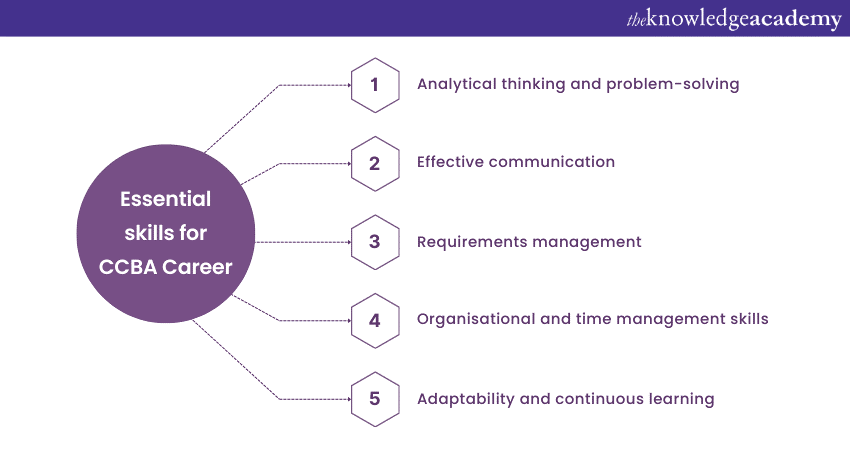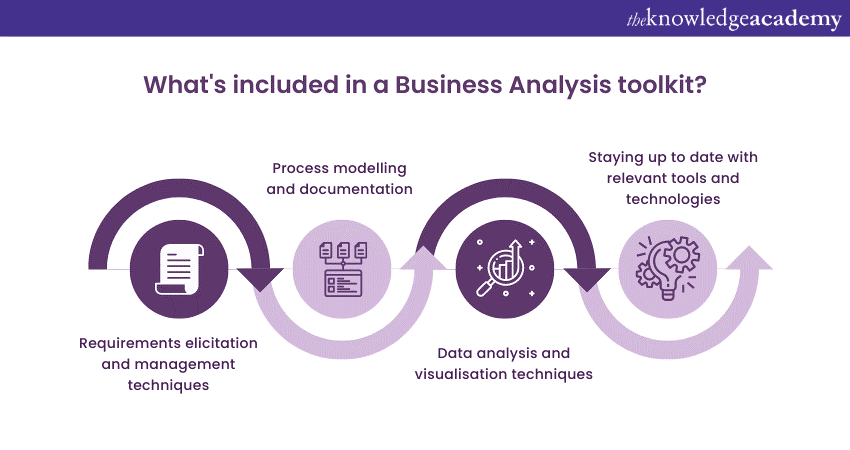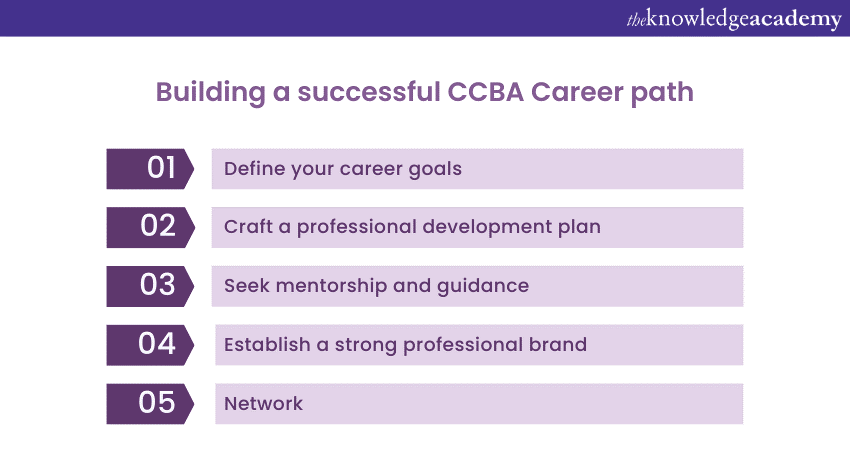We may not have the course you’re looking for. If you enquire or give us a call on +44 1344 203 999 and speak to our training experts, we may still be able to help with your training requirements.
Training Outcomes Within Your Budget!
We ensure quality, budget-alignment, and timely delivery by our expert instructors.

The field of business analysis is a vital pillar in today's dynamic business landscape, serving as a crucial bridge between organisational objectives and effective solutions. Whether you're aspiring to become a business analyst or aiming to advance your existing CCBA (Certification of Capability in Business Analysis) career, this comprehensive guide is specifically designed to help you unlock the secrets to success. Throughout this guide, we will explore the key elements that define a thriving CCBA career, encompassing the understanding of a business analyst's role, the acquisition of essential skills, and the navigation of the job market.
As you embark on this journey, it is important to note the immense opportunities within the field of business analysis. Recent industry reports reveal a strong demand for skilled business analysts, with job opportunities projected to grow significantly in the coming years. Moreover, professionals holding the CCBA certification reportedly earn higher salaries compared to their non-certified peers, making it a valuable credential in the competitive job market. Armed with these insights and supported by practical advice and resources, this guide will empower you to not only excel in the CCBA certification but also thrive in your daily business analysis endeavours. Join us as we uncover the secrets to a fulfilling and prosperous CCBA career.
Table of Contents
1) Understanding the Role of a Business Analyst
2) Mastering Essential Skills for CCBA Career
3) Gaining Domain Knowledge and Industry Expertise
4) Developing a Business Analysis Toolkit
5) Building a Successful Career Path
6) Navigating the Job Market for CCBA Professionals
7) Advancing your CCBA Career
8) Conclusion
Understanding the role of a Business Analyst
The role of a business analyst is essential in driving successful business outcomes. Business analysts act as the bridge between business needs and technological solutions, ensuring that organisations achieve their objectives effectively and efficiently.
At its core, the role of a business analyst revolves around analysing business processes, identifying areas for improvement, and defining requirements for new solutions. They collaborate with stakeholders from various departments to understand their needs, elicit requirements, and translate them into clear and concise documentation. By doing so, business analysts ensure that the proposed solutions align with the strategic goals of the organisation.
In addition to requirements management, business analysts play a vital role in facilitating communication and fostering collaboration among stakeholders. They act as the mediators, ensuring that all parties involved understand each other's perspectives and work towards a common goal. Effective communication and relationship-building skills are key to their success in facilitating productive discussions and gaining buy-in from stakeholders.
Business analysts also contribute to the decision-making process by conducting thorough analysis, evaluating alternatives, and providing recommendations based on data and insights. They help stakeholders make informed choices that drive positive business outcomes.
Mastering essential skills for CCBA Career
To excel in a Certification of Capability in Business Analysis (CCBA) career, it's crucial to develop and master essential skills that set you apart as a business analyst. These skills will not only help you succeed in the CCBA exam but also enable you to thrive in your daily business analysis endeavours.

1) First and foremost, analytical thinking and problem-solving skills are the backbone of a successful business analyst. You'll be faced with complex challenges and tasked with finding innovative solutions. Being able to analyse information, identify patterns, and think critically will empower you to make informed decisions and drive positive outcomes.
2) Another essential skill is effective communication. As a business analyst, you'll be interacting with stakeholders from diverse backgrounds, including business leaders, developers, and end-users. The ability to convey ideas clearly, listen actively, and adapt your communication style to different audiences is paramount. Strong communication skills foster collaboration, build trust, and ensure everyone is on the same page.
3) Requirements management is another vital skill for a business analyst. This involves the ability to gather, document, and prioritise requirements effectively. You'll need to employ various techniques to elicit requirements, ensure they are well-defined and actionable, and manage changes throughout the project lifecycle. A solid grasp of requirements management ensures that solutions align with business needs and goals.
4) Business analysts also need to possess strong organisational and time management skills. You'll juggle multiple projects, stakeholders, and deadlines simultaneously. Being able to prioritise tasks, manage your time effectively, and stay organised will enable you to deliver high-quality results in a fast-paced environment.
5) Lastly, adaptability and continuous learning are essential for success. The field of business analysis is constantly evolving, with new methodologies, technologies, and industry trends emerging. Embracing change, staying curious, and actively seeking opportunities for professional growth and development will keep you ahead of the curve and ensure your skills remain relevant.
Elevate your business analysis skills with CCBA® training - Register now to take your career to new heights!
Gaining domain knowledge and industry expertise
In order to excel as a business analyst, it's essential to acquire domain knowledge and industry expertise. These elements play a significant role in understanding the unique challenges and opportunities within a specific industry and enable you to provide valuable insights and solutions.
1) Stay informed about the latest trends, market dynamics, and emerging technologies within your industry. This knowledge allows you to speak the language of the domain, understand the nuances, and grasp the specific requirements and constraints associated with it. It empowers you to contribute meaningfully to projects and propose innovative solutions that address the industry's evolving needs.
2) Acquiring domain-specific knowledge involves delving into the inner workings of the industry or sector you're operating in. This includes understanding the key players, industry regulations, common business processes, and specialised terminology. By becoming well-versed in the intricacies of the domain, you can effectively analyse business needs, translate them into actionable requirements, and propose tailored solutions that meet industry standards and requirements.
3) Staying curious and continuously expanding your knowledge is crucial in the ever-evolving business world. Engage in industry forums, attend conferences and seminars, and network with professionals in the field. These activities provide valuable opportunities to learn from others, stay abreast of industry advancements, and gain insights from experienced practitioners. By staying curious and continuously expanding your domain knowledge, you position yourself as a trusted advisor and valuable asset to organisations.

Developing a Business Analysis toolkit
Creating a robust business analysis toolkit is essential for success as a business analyst. This toolkit consists of a range of techniques, methodologies, and tools that help you effectively gather, analyse, and communicate information, enabling you to deliver valuable insights and drive informed decision-making.

1) Requirements Elicitation and Management Techniques are fundamental components of your toolkit. These techniques allow you to gather requirements from stakeholders and ensure that they are documented accurately and clearly. Techniques such as interviews, workshops, surveys, and observations help you uncover and understand stakeholder needs, enabling you to define requirements that align with business objectives.
2) Process Modelling and Documentation are Valuable Tools in Your Toolkit. By utilising techniques such as process flowcharts, swimlane diagrams, and use case diagrams, you can visually represent and analyse complex business processes. These tools enable you to identify inefficiencies, bottlenecks, and areas for improvement, providing a solid foundation for proposing process enhancements and streamlining operations.
3) Data Analysis and Visualisation Techniques are essential for turning raw data into meaningful insights. Using tools such as spreadsheets, data visualisation software, and statistical analysis methods, you can analyse data sets, identify patterns, and visualise trends. This enables you to present information in a clear and concise manner, facilitating better understanding and decision-making.
4) Staying up to Date with Relevant Tools and Technologies is crucial for enhancing your effectiveness as a business analyst. Project management software, requirements management tools, collaboration platforms, and data analytics software are just a few examples of tools that can support your work and improve your efficiency in managing projects, documenting requirements, and collaborating with stakeholders.
Unlock your potential in business analysis with comprehensive training from industry experts - Explore our IIBA® Business Analysis courses today!
Building a successful CCBA Career path
Building a successful Certification of Capability in Business Analysis (CCBA) career path requires careful planning and strategic steps to reach your professional goals. Whether you're starting your journey as a business analyst or looking to advance your existing career, a well-defined path can guide you towards success in the field.

1) Defining your career goals is crucial. Take the time to reflect on what you want to achieve in your CCBA career. Consider the positions you aspire to, the industries you're interested in, and the impact you want to make. Setting clear goals will provide you with a sense of direction and help you stay focused on your path to success.
2) Crafting a professional development plan is essential for continuous growth. Identify the skills and knowledge areas you want to strengthen and set milestones to track your progress. This may involve pursuing additional certifications, attending relevant training programs, participating in industry conferences, or seeking mentorship from experienced professionals. By investing in your professional development, you enhance your expertise and broaden your opportunities in the business analysis field.
3) Seeking mentorship and guidance from industry experts can significantly accelerate your career growth. Look for experienced professionals who can provide valuable insights, advice, and support. Mentors can share their experiences, offer guidance on navigating challenges, and help you expand your professional network. Seek mentorship opportunities through professional organisations, networking events, or online platforms dedicated to business analysis.
4) Establishing a strong professional brand is a strategic move in building your CCBA career path. Create an online presence through platforms like LinkedIn, where you can showcase your skills, accomplishments, and industry knowledge. Share your insights, contribute to discussions, and engage with the business analysis community. Building a personal brand positions, you as a knowledgeable and influential professional, opening doors to new opportunities and connections.
5) Lastly, networking plays a vital role in career advancement. Attend industry events, join professional organisations, and engage in online communities to expand your network. Networking allows you to connect with like-minded professionals, gain industry insights, and uncover new career prospects. Building meaningful relationships within the business analysis community can open doors to collaborations, mentorship, and career opportunities.
Take your business analysis career to the next level with CBAP® certification training - Register now and become a certified expert!
Navigating the job market for CCBA professionals
In today's dynamic job market, it's essential for Certification of Capability in Business Analysis (CCBA) professionals to navigate the landscape strategically. By employing effective strategies, you can position yourself for success and secure rewarding job opportunities in the field of business analysis.
Stay Informed About Job Trends
Stay up-to-date with industry trends, changes, and emerging domains within business analysis. Research the job market to understand the demand for CCBA professionals and the evolving roles and required skills in the field.
Polish your resume and cover letter
Tailor your resume to highlight relevant skills, certifications, and experience that align with business analysis roles. Clearly articulate your CCBA credentials and emphasise your expertise. Customise your cover letter to demonstrate how you can add value to prospective employers
Here’s an example of a CCBA Resume:
|
[Your Name] [Address] [City, State, ZIP Code] [Phone Number] [Email Address] Objective: Results-oriented and highly skilled CCBA professional with [X] years of experience in business analysis. Adept at gathering requirements, analysing data, and translating business needs into actionable solutions. Seeking to leverage expertise in a challenging business analysis role to drive organisational growth and success. Professional Experience: Business Analyst | ABC Company | [Dates] a) Led requirements gathering and analysis efforts for multiple projects, ensuring alignment with business objectives. b) Conducted stakeholder interviews, facilitated workshops, and performed data analysis to identify key business needs. c) Developed comprehensive business requirement documents and use case models, ensuring clarity and accuracy. d) Collaborated with cross-functional teams to drive successful project delivery and implementation. e) Proactively identified process improvement opportunities, resulting in increased operational efficiency and cost savings.
Business Systems Analyst | XYZ Corporation | [Dates] a) Conducted in-depth analysis of business processes, systems, and workflows to identify areas for optimisation. b) Collaborated with stakeholders to define project scope, objectives, and success criteria. c) Created functional specifications and user stories, serving as a guide for development teams. d) Worked closely with QA teams to ensure comprehensive testing and adherence to requirements. e) Supported end-users during system implementations, providing training and ongoing support.
Skills: a) Business requirements elicitation and documentation b) Process modelling and analysis c) Stakeholder management and communication d) Data analysis and reporting e) Agile project management f) Tools: MS Office Suite, Visio, JIRA, SQL
Education: Bachelor of Science in Business Administration [University Name] [Year of Graduation]
Certifications: Certification of Capability in Business Analysis (CCBA) | IIBA | [Year] |
We’re also including a sample cover letter to go with the above resume template:
|
[Your Name] [Address] [City, State, ZIP Code] [Phone Number] [Email Address] [Date]
[Employer's Name] [Company Name] [Address] [City, State, ZIP Code]
Dear [Employer's Name], I am writing to express my strong interest in the [Job Title] position at [Company Name], as advertised on [Job Board/Company Website]. With my solid foundation in business analysis and my CCBA certification, I am confident in my ability to contribute to your organisation's success.
As a seasoned business analyst with [X] years of experience, I have successfully led requirements gathering and analysis efforts for diverse projects. I am skilled in conducting stakeholder interviews, facilitating workshops, and performing data analysis to uncover key business needs. I excel in translating requirements into comprehensive documentation, ensuring clarity and alignment with business objectives.
Throughout my career, I have demonstrated a strong aptitude for collaborating with cross-functional teams to drive successful project delivery. I have a proven track record of identifying process improvement opportunities and implementing innovative solutions that enhance operational efficiency and generate cost savings.
With my proficiency in business analysis methodologies, tools, and techniques, including MS Office Suite, Visio, and JIRA, I am confident in my ability to contribute value to [Company Name]. I am also well-versed in agile project management principles and have a solid understanding of industry best practices.
I hold a Bachelor of Science in Business Administration and have recently obtained my CCBA certification from the International Institute of Business Analysis (IIBA). This certification validates my expertise and commitment to the field of business analysis.
I am excited about the opportunity to join [Company Name] and contribute to its continued growth and success. I am confident that my skills, experience, and passion for business analysis make me an ideal fit for the [Job Title] position.
Thank you for considering my application. I would welcome the opportunity to discuss how my qualifications align with your organisation's needs. Please find attached my resume for your review. I look forward to hearing from you soon.
Sincerely, [Your Name] |
Leverage Professional Networks
Join business analysis communities, attend industry events, and engage with professional organisations. Network with peers, industry experts, and potential employers. Participate in online forums, webinars, and networking events to expand your connections and gain insights.
Utilise Job Search Platforms and Resources
Explore job search platforms specifically focused on business analysis roles. Utilise online resources, such as professional forums, LinkedIn groups, and industry-specific websites, to discover job opportunities and networking prospects.
Prepare for Interviews
Research prospective companies, understand their business models, industry landscape, and ongoing projects. Practice common interview questions related to business analysis. Showcase your domain knowledge, problem-solving abilities, and experience aligning business objectives with technological solutions.
Develop a Strong Online Presence
Create a professional LinkedIn profile to showcase your skills, certifications, and accomplishments. Share relevant content, engage in industry discussions, and connect with other professionals. Demonstrate thought leadership through blog posts, articles, or speaking engagements.
Advancing your CCBA Career
Advancing your CCBA (Certification of Capability in Business Analysis) career involves a proactive approach to continuous growth and seizing new opportunities. By implementing strategic steps, you can elevate your career and reach new heights in the field of business analysis.

1) Expand Your Knowledge and Expertise: Stay abreast of the latest trends, methodologies, and industry best practices in business analysis. Seek opportunities for professional development, such as advanced certifications or specialised training programs, to deepen your expertise in specific areas of interest. Engage in continuous learning through webinars, workshops, and industry conferences to enhance your knowledge and skills.
2) Seek Leadership Opportunities: Demonstrate your leadership capabilities by taking on roles that allow you to drive change, influence stakeholders, and lead cross-functional teams. Showcase your ability to effectively communicate, solve complex problems, and deliver successful business analysis outcomes. Look for opportunities to mentor junior business analysts and contribute to the growth of the business analysis community.
3) Embrace Technological Advancements: Stay informed about emerging technologies and their impact on the business analysis field. Develop proficiency in tools and software relevant to business analysis, such as data analytics platforms, requirements management tools, and process modelling software. Explore how emerging technologies, such as artificial intelligence and machine learning, can enhance your business analysis practices and drive innovation.
4) Network and Collaborate: Build a strong professional network by actively participating in business analysis communities, attending industry events, and engaging in online forums. Collaborate with professionals from diverse backgrounds, including stakeholders, subject matter experts, and fellow business analysts. Engage in knowledge sharing, exchange ideas, and learn from the experiences of others in the field.
5) Seek Challenging Assignments: Take on challenging projects and assignments that stretch your abilities and allow you to develop new skills. Seek opportunities to work on projects with strategic significance and a high impact on the organisation. Demonstrate your adaptability and versatility by taking on diverse roles within business analysis initiatives.
6) Establish a Professional Brand: Develop a strong online presence through professional networking platforms, such as LinkedIn. Share thought leadership articles, insights, and experiences to establish yourself as a respected professional in the business analysis community. Actively contribute to industry discussions, speak at conferences, or participate in panel discussions to enhance your visibility and credibility.
Start your journey in business analysis with ECBA® certification training - Lay the foundation for a successful career today!
Conclusion
In conclusion, building a successful CCBA career requires setting clear goals, continuous learning, developing a strong professional brand, and overcoming challenges with adaptability. By leveraging skills, knowledge, and strategic planning, you can unlock the secrets to a thriving CCBA career and make a meaningful impact in the field of business analysis. Best of luck on your journey!
Enhance your business analysis skills and drive success with our comprehensive training courses - Explore our Business Analysis Training today!
Frequently Asked Questions

Industries such as finance, healthcare, IT, manufacturing, retail, and telecommunications are in high demand for certified CCBA professionals. These sectors value CCBA expertise for improving processes, driving efficiency, and implementing strategic business solutions.

For CCBA recertification, professionals must earn 60 Continuing Development Units (CDUs) within three years, adhering to the International Institute of Business Analysi) (IIBA) guidelines. Additionally, they need to submit a renewal application and pay the recertification fee.

The Knowledge Academy takes global learning to new heights, offering over 30,000 online courses across 490+ locations in 220 countries. This expansive reach ensures accessibility and convenience for learners worldwide.
Alongside our diverse Online Course Catalogue, encompassing 19 major categories, we go the extra mile by providing a plethora of free educational Online Resources like News updates, Blogs, videos, webinars, and interview questions. Tailoring learning experiences further, professionals can maximise value with customisable Course Bundles of TKA.

The Knowledge Academy’s Knowledge Pass, a prepaid voucher, adds another layer of flexibility, allowing course bookings over a 12-month period. Join us on a journey where education knows no bounds.

The Knowledge Academy offers various IIBA® Business Analysis Training, including IIBA® Entry Certificate in Business Analysis (ECBA™) Course, IIBA® Certified Business Analysis Professional (CBAP®) Course and IIBA® Certification of Competency in Business Analysis (CCBA®) Course. These courses cater to different skill levels, providing comprehensive insights into Mind Map.
Our Business Analysis Blogs cover a range of topics related to Business Analysis, offering valuable resources, best practices, and industry insights. Whether you are a beginner or looking to advance your Business Analysis skills, The Knowledge Academy's diverse courses and informative blogs have you covered.
Upcoming Business Analysis Resources Batches & Dates
Date
 IIBA® Certification of Competency in Business Analysis (CCBA®)
IIBA® Certification of Competency in Business Analysis (CCBA®)
Thu 30th Jan 2025
Thu 27th Feb 2025
Thu 20th Mar 2025
Thu 29th May 2025
Thu 3rd Jul 2025
Thu 4th Sep 2025
Thu 27th Nov 2025







 Top Rated Course
Top Rated Course


 If you wish to make any changes to your course, please
If you wish to make any changes to your course, please


